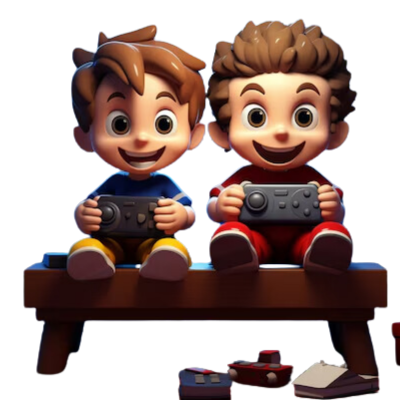Introduction: A New Era in Gaming
Artificial Intelligence (AI) is reshaping industries at an unprecedented rate. However, one domain where its influence has been particularly groundbreaking is console game development. The fusion of AI with gaming technology has opened new doors, leading to immersive, dynamic, and smarter gaming experiences.
The transition from static, rule-based systems to adaptive, learning-driven processes is transforming not only how games are played but also how they’re created. Let’s dive into how AI is revolutionizing console game development, its advantages, challenges, and what the future holds for console game development companies and players alike.
Dive Into Gaming's Epic Journey!
To turn these ideas into production-ready solutions, partnering with expert AI development services can help you design, build, and scale your AI initiatives.

A Glimpse into AI’s Role in Gaming History
AI’s relationship with gaming didn’t start yesterday. In fact, its roots stretch back decades. Pong and Pac-Man, iconic games from the 1970s and ’80s, were early demonstrations of AI’s potential, albeit in its simplest form. These titles featured rudimentary systems where NPCs followed pre-set patterns or responded in basic ways to player actions. Players quickly learned the rhythm, memorizing movement patterns. It was predictable, but that was the charm.
Fast forward to the late 1990s and early 2000s, when AI took a leap forward. Titles like Half-Life and Halo showcased non-playable characters (NPCs) who exhibited reactive behaviors. They dodged, hid, or attacked depending on the player’s actions. Yet, even then, the system was still rule-based. It didn’t learn, it followed scripts. Now? We’re in a different era. AI has moved from following commands to learning from players. It has transitioned from static to dynamic, evolving alongside gaming hardware, particularly in the realm of console game development services and tools used by top game development companies.
AI's Expanding Influence on Console Game Development
As AI continues to evolve, its impact on console video game development services is profound. The scope of its influence is wide, affecting how developers approach console game development, procedural generation, NPC behavior, testing, and even the difficulty settings of games. AI’s footprint in gaming is massive, and it’s only growing.
1. AI-Driven Game Design: Evolving Creativity
Procedural content generation (PCG), driven by AI, is a shining example of this shift. Games like Minecraft or No Man’s Sky boast sprawling, seemingly endless worlds, each uniquely generated through algorithms. Imagine designing billions of planets manually—impossible, right? Yet with AI, these worlds can be brought to life in seconds, filled with varied terrain, climates, and creatures. What does this mean for console video game development agencies? Endless replayability. Each time you fire up the game, you get something different, something new.
On top of that, AI can analyze player behavior and offer insights into how a game might be adjusted to make it more intuitive and engaging. That’s right, AI isn’t just creating; it’s learning, adapting, and improving the very fabric of console game development services.
Game design used to be a painstaking, manual process. Developers spent countless hours crafting every corner of the virtual world, designing each character’s movement, building entire story arcs from scratch. Now, console game development companies are turning to AI to lighten the load. With AI tools, developers can automate much of this process, allowing for more efficient creation of assets, environments, and even the storyline itself.
2. Procedural Generation: Crafting Massive Worlds
One of AI’s most dazzling contributions to console game development is its ability to craft intricate game worlds through procedural generation. Before AI’s involvement, designers hand-built environments, one mountain, one village at a time. While beautiful, this method limited scale. Now, console development experts can use AI to generate endless landscapes that are rich with detail, dynamic, and ever-changing.
Take No Man’s Sky as an example. Its universe is procedurally generated by AI, featuring over 18 quintillion planets. Each planet is unique in its geography, flora, and fauna. Without AI, this level of diversity in video game consoles would be impossible. Minecraft also demonstrates procedural generation, giving players randomly generated worlds to explore and reshape.
For gaming console enthusiasts, this technology is a gift. Every playthrough feels fresh, offering a sense of discovery even after hours of gameplay. AI breathes life into these massive universes, ensuring that no two sessions are ever the same, a significant advantage for console video game development agencies looking to provide unparalleled replayability.
3. NPC Behavior: Smarter and More Realistic Characters
If you’ve ever found yourself in a heated battle with an enemy NPC that seemed eerily intelligent, that’s AI at work. NPC behavior has evolved drastically from the days when enemies followed predictable patterns. Today, AI makes NPCs smarter, more strategic, and adaptable to the player’s style, enhancing the overall experience that game dev companies aim to deliver.
Take The Last of Us Part II, for instance. The enemies aren’t just cannon fodder. They communicate, strategize, and react dynamically to your actions. Hide in one spot for too long, and they’ll flush you out. Try to flank them, and they’ll adapt. It creates a level of immersion that’s hard to match with traditional game design techniques.
AI is also responsible for giving NPCs a memory. In some games, if you kill a notable enemy, their allies might remember it and retaliate later. The Nemesis System from Middle-earth: Shadow of Mordor takes this a step further, creating unique narratives based on how you interact with enemies.
For console game development companies, this represents a major leap forward in crafting more dynamic, personalized, and immersive gaming experiences.
4. Adaptive Difficulty: Tailoring the Challenge to Players
AI doesn’t just create smarter enemies; it also adjusts the difficulty curve to match your skill level. We’ve all experienced the frustration of a game that’s either too easy or too hard. AI helps solve this problem through dynamic difficulty adjustment, making console video game development services more player-friendly.
Unlike static difficulty modes (easy, normal, hard), AI-powered games can adjust in real-time. Resident Evil 4, for example, increases or decreases enemy aggression depending on how well or poorly you’re playing. Struggling to defeat a certain boss? AI might subtly make things easier without you even noticing. Conversely, if you’re cruising through enemies, AI can ramp up the challenge.
This real-time adjustment ensures that players are neither bored nor overwhelmed, offering a more engaging and satisfying experience that keeps them coming back—a vital aspect that console game development companies strive to perfect.
Play the Best, Know the Rest!
For implementation, our AI consulting company can help you operationalize the strategies and use cases discussed in this article.

5. AI-Driven Game Testing: A Faster Path to Perfection
Game testing is essential but often a bottleneck in the development process. Traditionally, large teams of human testers played through levels repeatedly, looking for bugs or glitches. This manual process was time-consuming and prone to human error. Enter AI.
AI-powered testing tools can automatically scan games for bugs at a speed and accuracy far beyond what humans can achieve. These AI systems simulate countless player interactions, running through different scenarios to test how the game reacts. This makes the development process more efficient and reduces the risk of glitches slipping through the cracks. For game development services, this is invaluable in producing more polished final products.
Additionally, post-launch, AI can monitor player behavior to detect any bugs that might have gone unnoticed during testing. This ensures that game patches and updates are more targeted and effective, leading to a smoother gaming experience, a crucial aspect for game consoles and their users.
6. Personalized Experiences: Gaming Tailored to You
AI isn’t just improving NPC behavior or difficulty scaling—it’s personalizing entire game experiences. AI can track how players make decisions, what elements they enjoy most, and adapt the gameplay accordingly. This extends beyond just adjusting difficulty or NPC intelligence. It can influence the types of quests, challenges, or rewards players receive, ensuring every experience feels tailored—a prime service that console video game development agencies are increasingly offering.
In games like Shadow of Mordor, AI’s Nemesis System tracks your interactions with enemy characters, building a unique narrative around your choices. These personalized story arcs are unique to each player, creating an organic and immersive narrative experience.
Beyond that, AI can also suggest in-game purchases or expansions based on a player’s preferences. While this might raise concerns about monetization, when done ethically, it enhances the user experience by delivering content that aligns with player interests. This approach is increasingly adopted by console game development services to offer a more dynamic and engaging user experience.
The Future of AI in Console Game Development
AI’s potential in gaming is vast, and console game development experts believe we’ve only scratched the surface of what’s possible. In the future, we may see AI-generated storylines, more advanced NPC interactions, and even more personalized game experiences, which will revolutionize how game development companies operate.
1. AI-Generated Narratives
Imagine a game where the storyline evolves dynamically based on your decisions, not just through pre-scripted choices but through real-time AI-generated plots. These AI-driven narratives could offer nearly endless replayability, as no two playthroughs would ever be the same, making console video game development services more appealing to gamers seeking dynamic experiences.
2. Greater Realism
As AI systems improve, NPCs will only become more lifelike. We’re already seeing leaps in AI-driven motion capture and facial animation, but as these systems become more sophisticated, the line between real and virtual characters will blur further, enhancing immersion for gaming consoles.
3. AI in the Cloud
Cloud gaming is on the rise, and AI will play a critical role here. By optimizing performance in real-time, AI will ensure smoother gameplay, even on lower-end consoles or devices. This will democratize high-quality gaming, making it accessible to a broader audience and pushing console game development services into new realms.
Hire Console Game Developer's
Our team of expert is on hand to assist you

Conclusion: VR is More Than a Gimmick—It’s the Future
AI’s influence on console game development is both profound and far-reaching. From creating vast, procedurally generated worlds to personalizing gameplay experiences, AI is changing how developers approach every aspect of game design. While challenges remain, especially in terms of complexity and ethical considerations, the benefits are undeniable for console game development companies and game dev companies alike.
As AI evolves, we’ll see fresh breakthroughs across the industry. Console games will feel more dynamic, more adaptive, and far more immersive. The goal isn’t to replace human creativity but to support it with stronger tools and smarter systems. With the help of an experienced enterprise ai development company, these advances will continue to grow, pushing gaming toward new and exciting possibilities.



